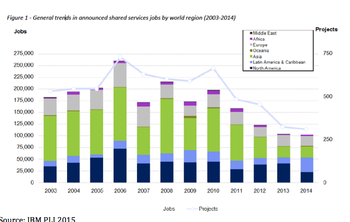Is it Time to Reconsider 'Nearshore'?
Add bookmarkIntroduction
There is no denying the continued validity of shared services as a business value enabler. However, today the focus is on leveraging technology to replace FTEs and at the same time promote flexibility, agility, collaboration, and business intelligence to support high-end value creation. In addition, with so many of today’s shared services having reached a certain mid-stage of maturity, costs are significantly contained and the business case now hinges on driving value – more often than not based on business intelligence.
Global Trends in Shared Services Investment Increasingly Favour Europe
While shared services expansion today is still only at half the record levels set in 2006 [when more than 250,000 shared services jobs were created worldwide and around 700 projects initiated], a recent report by IBM PLI suggests that shared services centre investment is likely to continue – albeit at more moderate volumes, and focused on "further optimizing activities for particular functions or geographies".
The same report points to a strong reversal in Asian- and North American-based shared services job growth (both reduced to around 25% of total new jobs), while Europe stands out as continuing to attract the lion share of shared services projects worldwide [accounting for more than 40% of projects in 2014, although the lower FTE numbers in these centres means Europe only accounts for 20% of total jobs). Despite average centre size in Europe remaining relatively stable over the last 10 years [at just under 200 FTEs, compared to Asia's current 750 average], the emphasis today is on leveraging FTE capability as opposed to amassing large numbers.
As Deloitte’s 2013 Global Shared Services Survey points out, labour cost differentials for non-IT business processes still favour Europe, given a predisposition to a nearshore solution. If the US benchmark labour cost is at 100, Europe ranks in the 50-60 range (similar to Latin America), compared to India in the 20-25 range [Source: Deloitte’s 2013 Global Shared Services Survey].
New Era Heralds UK’s Nearshore Advantage
In a recent report by the Loughborough Research Centre for Global Sourcing and Services [UK Attractiveness: Outsourcing Services, 2013], the new era of value adding services, innovation, and transformation is characterized by a shift from competition to skills and expertise, with a key focus on transformation. This search for superior skills is leading many organizations to evaluate nearshore service delivery opportunities in the UK. The shift towards value-add services is, therefore, positioning the UK as a key contender for high-value outsourcing/services delivery destinations.
According to Loughborough’s report, this shift is being driven by three trends:
- The maturity of the outsourcing industry is driving more clients to seek an impact on business and strategic performance from providers
- Increasingly complex service delivery models are focusing on managerial capabilities such as relationship management as opposed to technical capabilities
- As outsourcing-driven growth is a key strategic driver for partnership, locations with promising entry points to lucrative markets are becoming more attractive. The UK's potential as an entry point to the US market is a case in point.
While the research acknowledges the relative high cost base of the UK economy, it also asserts that the "high service standards, access to skills, entry point to mainland Europe and USA, government support, and supportive infrastructure are unique value propositions."
Investors Confident in UK
The UK’s advantage is also confirmed in EY’s 2015 UK Attractiveness Survey, which highlights the record number of 887 projects [up 11% on 2013] that the UK achieved in foreign direct investment in 2014, which led to a market-leading 31,190 jobs created. The report states: "The UK leads the market with 29% of US projects in Europe and was also the main destination for investment in Europe from France, Japan, Australia, Canada, India and Ireland." The broad distribution of investment across UK regions (Wales, Northern Ireland, England and Scotland) is a sign that UK Trade and Investment’s attempts to support economic rebalancing across the country are working.
EY’s survey of over 400 investors confirms confidence in the UK remains high, ranking it fourth globally, behind the US, China and India. The report strikes a note of caution, however: as "access to the European single market" is an important element of the UK's attractiveness to foreign investors (for 72% of investors), the upcoming referendum on European Union membership poses a potential risk. Thirty-one per cent of investors indicate they will either freeze or reduce investment until the outcome of the referendum is known [Source: EY 2015 UK Attractiveness Survey].
Talent Drives ROI
In a recent report [Where Will Shared Services Go Next?] Deloitte, while allowing that labour cost arbitrage continues to drive many business services decision-makers offshore, also highlighted that those who have consolidated their operations in locations with higher market costs have nevertheless, as a result of access to more productive talent pools, enjoyed a positive return on their investment. This, above all else, may turn out to be the critical driver for shared services decisions in the next decade. Selective BPO partnering still has its place, particularly where companies want access to state-of-the-art technologies including the latest RPA, but the real value driver will come from staff accessing data analytics, leveraging business intelligence, and prescribing value adding activities for their business customers.
UK Buyers Leading Shift to Nearshore
As UK-based buyers make up approximately 11% of the global shared services market [the US accounts for 53%] their shifting preference towards nearshore locations [34% are opting for the UK compared to 36% opting for India, according to Everest Group] has influenced the growth in UK centre activity. The trend of UK buyers shifting from offshore to nearshore service delivery models has been steadily increasing over the past seven years [currently at 41% nearshore versus 59% offshore]. Geographical proximity also translates to less time spent traveling, and lower costs of managing faraway offshore locations – significant considerations, as many SSO leaders belatedly learned.
[eventpdf]
Is Nearshoring Right for You?
The benefits of leveraging nearshoring opportunities are plenty:
- Language alignment
- Cultural alignment
- Proximity to critical customers and operations
- Minimal time zone variants
- Reduced travel
- Wage arbitrage by shifting to second-tier/university towns
- Remarking salaries to market can further reduce labour costs
- English language is an advantage for international business, particularly US
- Companies with early stage shared services experiencing resistance to offshoring can opt for UK
- Companies in mature shared services that wish to unroll outsource contracts and/or move services support closer to its home base will benefit
- With cost a reduced priority, a more customer centric knowledge based service is deliverable from nearshore locations
- After the initial stampede to low-cost Asian locations, today's decision-makers are making more balanced decisions in recognition of higher offshore risk profiles, potential currency fluctuations, and higher costs of managing remote teams and locations
Another factor that is encouraging more enterprises to consider nearshore services is the trend towards service delivery automation (or robotic process automation):
- More focus on value added tasks rather than transactional (which will be automated)
- Cost savings as a result of FTE elimination, fewer production errors, and improved quality mean work can be automated and kept onshore, closer to the business
- Positive compliance impact for regulated industries and reduced data and security risk
- Reduction in business continuity risk as disaster recovery is simplified by switching to other servers
















